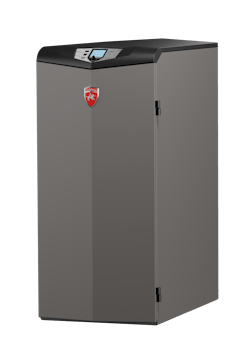Electric Boilers as the Decarbonization Key

The push toward electrification is moving at a rapid pace, whether we like it or not, and consumers and contractors alike need to be aware of the alternatives that are out in the market. CONTRACTOR magazine recently caught up with Ross Brawner, Lochinvar Product Manager, to discuss high-efficiency and electric boilers, and yes, heat pumps.
CONTRACTOR: How are high-efficiency and electric boilers working together to help solve decarbonization issues?
BRAWNER: As decarbonization initiatives continue to grow throughout the US, there has been an increased need for boiler technology solutions. Electric boilers have significant potential for many applications. These units already have an output on par with high efficiency gas units—and often offer critically important user-friendly features such as easy installation, fast startup/shutdown time and quiet operation. An electric boiler converts nearly 100% of the electrical energy into heat with no stack or heat transfer losses.
However, electric boilers are not always the ideal solution for every application, which is where high-efficiency combustion technology comes in. By converting water vapor to heat, condensing gas boilers are a highly efficient alternative to traditional non-condensing units. Condensing boilers deliver significantly higher efficiency than non-condensing units—and they’re also lighter and more compact. In builds and retrofits where engineers cannot or do not need to specify a fully electric unit, these high-efficiency condensing gas products can present an excellent alternative while still supporting a building’s transition to sustainable solutions. By offering both electric and high-efficiency boilers, we are able to ensure there is a sustainable solution to fit any application.
CONTRACTOR: I have a saying, "happy contractors, happy customers." Are you seeing more contractors open to electric boilers, heat pumps, etc.?
BRAWNER: As technology continues to develop and advance, and regulations progress, we see contractors being more and more open to electric boilers and heat pump water heaters. Many contractors have years and even decades of experience installing combustion equipment, and they understand that adopting this technology is critical to stay ahead of upcoming regulatory changes. Lochinvar creates “happy contractors” by giving them confidence installing different and newer technologies through our top-tier Lochinvar University training. When given the proper tools, contractors feel confident and more open to electric boilers and heat pump water heaters and space heating equipment.
CONTRACTOR: What are some of the latest trends and technologies that will ultimately help contractors sell and install these units?
BRAWNER: Even states with ambitious decarbonization goals are finding that there is a growing need for hybrid electric/gas systems that steadily lower carbon emissions rather than transitioning overnight to all-electric systems. With this comes the steady advancement of both types of boiler technologies. For example, Lochinvar’s LECTRUS™ Commercial Electric Boiler features a unique SMART SYSTEM™ controls platform that allows for modulation and staging of the elements to operate within the full kW range of the boiler.
Providing installation flexibility is also incredibly important for contractors. Each installation features a unique set of challenges and obstacles to work around. With the LECTRUS boiler, customers switching to or upgrading a fully electric boiler system can cascade up to eight units of varying sizes to create a customized system that best suits their application needs. Alternatively, customers who are looking to reduce their carbon emissions while still utilizing gas products can install the LECTRUS boiler alongside other condensing and non-condensing Lochinvar boilers to optimize performance and reduce carbon emissions.
On the condensing boiler side of the industry, there have also been many recent advancements in technology that makes condensing boilers more advantageous for contractors. Lochinvar continues to invest in the development of gas boiler technology.
For example, Lochinvar’s CREST with Hellcat™ Combustion Technology features an O₂ sensor system which utilizes Feed Forward, Feed Back, Commissioned Trim and Learned Trim. By combining the information provided by the advanced O2 sensor with Lochinvar’s Smart Touch™ control, the unit is able to adapt to the environment it’s installed in. Seasonal changes, drastic weather shifts and altitude are all compensated for with independent air and gas dampers that allow the boiler to perform optimally in any condition.
This adaptability makes it easier than ever for contractors to sell the technology in different climates and for different commercial installation needs. Plus, many of these technologies will be able to work together in hybrid systems or as stand-alone systems to give customers a diverse set of sustainable solutions.
CONTRACTOR: What are the incentives—other than the aforementioned carbon footprint aspect—for choosing electric boilers?
BRAWNER: Electric boilers do not use combustion technology and therefore they do not require venting, which reduces installation time and also gives additional flexibility on where the unit can be installed. Electric boilers also feature quieter operation in comparison to other technologies.
CONTRACTOR: I’m hearing some push back on electric and cold weather climates. How is Lochinvar working to tackle this?
BRAWNER: We strive to ensure that contractors have all of the information they need to find the right solution at the end of the day. Throughout the industry, there has been pushback and concerns about the transition to electric boilers and heat pumps. For example, there are some amperage considerations for retrofitting an existing gas system to all electric; whether it’s heat pumps or electric boilers. The electrical infrastructure must be sufficient enough to handle the load and we want to make sure our customers are well aware of everything they need to make the transition go smoothly. When it comes to heat pumps, the output will decrease as the ambient temperature goes down.
A good solution in these climates is the LECTRUS electric boiler, which can be installed in any indoor environment without losing performance—even in below-freezing ambient conditions. Tackling the pushback is all about providing the right information. That may result in a hybrid system featuring gas and electric or possibly all electric, but accurate information is the key.
CONTRACTOR: What would be any major differences and usages between electric boilers and heat pumps?
BRAWNER: Electric boilers are going to shine in cold weather climates and many retrofit applications. The cold climate will not affect the output of the boiler and in retrofit applications, an electric boiler, like the LECTRUS boiler, will have a higher maximum setpoint for older heat distribution systems that require hotter water.
Heat pumps transfer Btus from the air or some type of source water into a refrigeration loop that heats up the hydronic water in the system. This technology, in the right conditions, can result in a coefficient of performance (COP) of up to 4 or higher. However, in cold climates, the output and performance will decrease as the temperature drops. Also, maximum setpoints tend to be lower than electric boilers so unit sizing and making sure the heat distribution system is sized appropriately is critical to setting up a successful system.
CONTRACTOR: You mentioned Lochinvar University earlier. How does Lochinvar offer continued training on these units?
BRAWNER: With the development of new boiler technologies, contractor training is more important than ever. Training resources like Lochinvar University offer both online and in-person education on a variety of units and features. We continue to add new resources as needed to ensure that contractors are equipped with the knowledge they need to take advantage of new technologies like the LECTRUS boiler. The LECTRUS boiler features Lochinvar’s SMART SYSTEM™ control platform, on which contractors can receive training and build their confidence faster. The control interface is specific to electric boiler technology but in a layout that will provide customers with a familiar look and feel that they are used to.
Lochinvar also has a mobile training truck that travels around the country to educate customers at their location. On the truck there are up to six models piped and wired so that display screens function as simulators, and the piping is reflective of real-world applications—complete with pumps and an expansion tank.
CONTRACTOR: Finally, how does Lochinvar's advocacy help with potential federal mandates?
BRAWNER: Lochinvar and its parent company, A. O. Smith, have an excellent government affairs and certifications team. This team works with federal and local governments, as well as various certification groups to ensure that legislators and certifying bodies have the best information available to make informed decisions.
